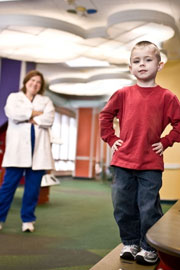Neurological Disorders In Children
The actions of one’s physique is monitored, manipulated and controlled by the nervous system which is a highly sophisticated and complex system. The spinal cord and the brain form the central or the nucleus of this nervous system with the other elements and nerves forming the nervous system. The central or the nucleus of the nervous system is instrumental in coordinating, regulating and controlling the body’s movements, thought process and also the behavioral patterns while the peripheral system accounts for relaying information to and from the central nervous system and the various glands, organs and muscles in the body.
The origins and causes
The neurological conditions in children may be caused by any one or more of the following:
- Degeneration
- Tumours
- Problems of metabolism
- Trauma
- Genetic problems
- Structural defects
- Direct exposure to drugs
- Infections
- Disruption of the flow of blood
- Exposure to toxic substances
There are individualistic effects of the various neurological conditions in children and every child may exhibit different symptoms. Some of the symptoms commonly found in these neurological conditions in children are:
- The size of the head may be abnormally small or large.
- There may be a lack or complete absence of coordination.
- The overall development may be slow.
- Abrupt and frequent changes in mood of the child.
- There may be a slurring of speech.
- There may be changes in the level or even a loss of consciousness.
- If the child is a little older, there may be complaints of frequent headaches, or impaired vision or even a loss of feeling and tingling sensation experienced by the child.
Consultation with a physician is a must!
Some of these symptoms may resemble those for other illness also; hence, it is advisable to consult your physician immediately when these symptoms surface as it is the question of your child’s health. There needs to be various tests performed for a proper diagnosis of the exact nature of the neurological conditions. The physician will have to create a good rapport with your child so that he gains utmost confidence and trust. For this, the physician will need to have lengthy and frequent sessions with the child.
Acquired Hydrocephalus
One of the neurological conditions in children is the Acquired Hydrocephalus which is the occurrence of abnormal amount of cerebrospinal fluid which accumulates in the cavity of the brain called the subarachnoid space. Frequently, this Acquired Hydrocephalus occurs at birth and may be due to an injury, or a disease or even tumour blocking and preventing the cerebrospinal fluid to be absorbed by the brain. A defect at birth or malfunction of the brain may lead to Congenital Hydrocephalus.
Organic pathology
The practice of organic pathology which may relate to prenatal damages such as intra-ventricular haemorrhage, ischemic strike, birth trauma and peri-ventricular leukomalacia may exhibit themselves in infants which are born premature. Such damages may lead to neurological conditions in children like mental retardation, epilepsy, various forms of disability, sensor neural lesions and cerebral palsy which may cause damage of a permanent nature or even prove fatal.

